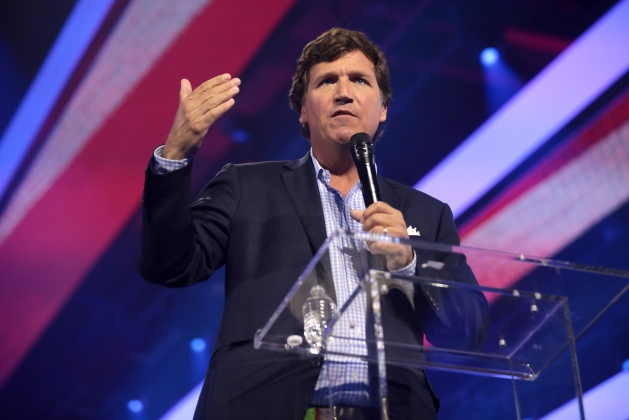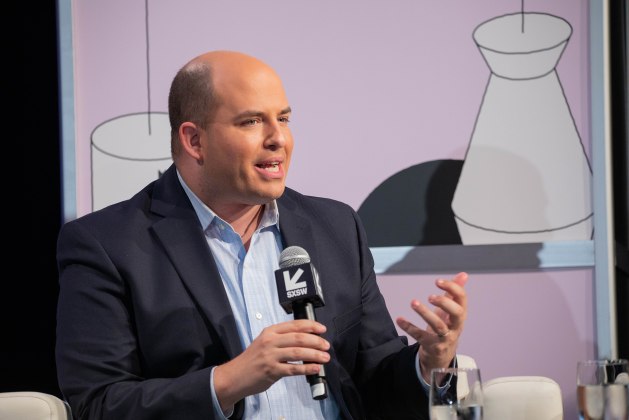
Jeff Zucker. Photo (cc) 2013 by Fortune Live Media.
Previously published at GBH News.
Cable news is a disgrace, especially during prime time. From 8 to 11 p.m. every Monday through Friday, the three outlets offer nothing but opinionated talk shows, CNN and MSNBC from the left, Fox News from the conspiratorial far right. It is a wasted opportunity.
But now CNN, the original cable news station — the one whose middle name is “news” — has a chance to reinvent itself. Last week CNN Worldwide president Jeff Zucker resigned after company officials learned he was involved romantically with his second-in-command, executive vice president Allison Gollust, who remains at CNN, at least for now.
It seems likely that there’s more to it. By the end of last week, Tatiana Siegel was reporting in Rolling Stone that Zucker and Gollust may have been advising Andrew Cuomo at the same time that the then-New York governor was appearing on Chris Cuomo’s CNN show. More to come, no doubt.
But whatever the reason, now is the perfect time for CNN to try something new. What Zucker was doing certainly wasn’t working. The man who foisted Donald Trump upon the media and political world, first with “The Apprentice” and later with hours upon hours of free air time during the 2016 presidential campaign, presided over a collapse in the ratings as soon as Trump left the White House. So what’s next?
Over the weekend, I asked my followers on social media and got some great responses. CNN employs boatloads of first-rate journalists. Why not let them shine? You’re probably not going to see CNN or its incoming owner, the Discovery network, actually try any of these ideas. And I’ll admit that there’s a retro quality to some of them. My defense is that they hark back to a time when CNN was good. And so it could be again.
Let’s get after it, as Chris Cuomo liked to say.
1. Launch a prime-time newscast. Did you ever realize that there isn’t a single newscast on any of the three cable “news” channels? It’s a pretty incredible omission. An insider once told me that it wouldn’t work because people are immersed in news all day on their phones and their laptops, and they want to watch people talk about it once evening comes along. Well, I don’t buy it.
As recently as 20 years ago, CNN offered a nightly prime-time newscast anchored by Aaron Brown, and MSNBC had one helmed by Brian Williams. Granted, that was before social media, but there’s no reason it can’t work again. The network’s three nightly newscasts all have higher ratings than cable news. Why not go with a solid hour of national and international news on CNN, serious but with more reporting, fewer talking heads and higher production values than the excellent but low-budget “PBS NewsHour”?
Who would anchor the CNN nightly newscast? My choice would be Audie Cornish, who recently left NPR to join CNN+, the digital streaming service that is scheduled to be unveiled this spring. CNN+ may be the future (or not), but the cable channel is the present. Let’s face it: Cable news appeals to older viewers who have no intention of cutting the cord and going with a streaming service. Why not leverage that with something they might actually watch? I’d slot the newscast for 8 p.m.
2. Bring back Larry King. Well, OK, the mainstay of 9 p.m. is no longer available, having died a year ago at the age of 87. And though King had his quirky charms, CNN could certainly find a host who’s better informed and more engaged. I’d suggest Anderson Cooper, one of the smartest and most versatile people at the network. Who better to talk with newsmakers, entertainers, authors and the like?
And by “talk with,” I mean “have a conversation.” When CNN put King out to pasture, they replaced him with Piers Morgan, a noxious Brit who held down the post for a few years in the early 2010s. It didn’t work, and eventually CNN put Chris Cuomo in that time slot as the host of a not-very-good political talk show. An interview program hosted by Cooper would be an ideal replacement.
3. Embrace the world. After a newscast at 8 and an interview show at 9, how about an international report at 10? CNN first earned the respect of viewers with its coverage of the Persian Gulf War in 1991. Even today, CNN International wins kudos for its quality and depth. Yet U.S. viewers rarely get to see any of that coverage.
Now, I realize that international news almost certainly would not be a ratings winner. But CNN’s numbers are already below water. Maybe Zucker’s replacements could figure out a way to slip past MSNBC, but are they really going to challenge Fox? Probably not. The alternative is to embrace quality in the hopes of attracting a prestige audience that will prove enticing to high-end advertisers. Capping the evening with an hour of well-reported international news is just the way to do that.
My first choice as anchor would be Christiane Amanpour, assuming her health would allow it. She’s got the history with CNN — she still holds the title of chief international anchor — and continues to be well liked by viewers.
4. Not so boldly into the future. Maybe I’ll be proven wrong, but CNN+ looks like a looming disaster. I simply can’t picture why anyone, even a cord-cutter, would pay for a streaming service so they can watch Chris Wallace.
Yet CNN is already sitting on a significant digital asset — CNN.com, the top-ranked news website. According to recent figures from Comscore, CNN.com and its apps attracted 143 million unique visitors a month in 2021, putting CNN Digital way ahead of The New York Times (89 million), FoxNews.com and NBCNews.com (about 87 million each) and The Washington Post (82 million).
The danger with CNN+ is that not only will it fail to sign up cable cord-cutters, but that it will harm CNN Digital as well.
CNN Digital isn’t just successful — it’s good, one of the best free national and international news sources available. I’d merge CNN+ into CNN Digital, offering all video programming free to users with a cable TV log-in (as is currently the case) while charging an extra fee to non-cable subscribers who want to watch video. The cable providers will go nuts, but they’re doomed in the long run anyway.
And keep the non-video news free for everyone.
5. Offer some specialized programming. This is a bit of a catch-all. My followers made a lot of good suggestions for shows that might appear weekly or occasionally. Several suggested a program rounding up local news from around the country — a tough sell, but possibly worth doing if it can be demonstrated how it’s broadly relevant. An investigative hour coproduced with the nonprofit news organization ProPublica. The return of “Crossfire” (sorry, but no).
I might want to turn the Friday edition of the Anderson Cooper interview show I’ve suggested into a political roundtable, edgier than PBS’s “Washington Week” but smarter than what’s currently on CNN. No shouting and no Trumpers allowed — although intelligent conservatives would certainly be welcome.
Several people weighed in with suggestions for changes in CNN’s tone and emphasis, which would also be welcome. For instance, Alex Howard, director of the Digital Democracy Project, called for the network to improve its culture, focus on hard news, original reporting and expert analysis, and examine ethics more closely when covering government and corporations.
Jeff Jarvis, a professor at the City University of New York’s Craig Newmark School of Journalism, concluded several ideas about how to improve CNN’s offering with this: “In short, throw the damned deck chairs overboard and ask: Why are we here? What value to we bring to society? Use it as an opportunity to start over.”
The opportunity to start over doesn’t come around very often. CNN’s executives now find themselves with a blank slate. Here’s hoping against hope that they make the best of it.










